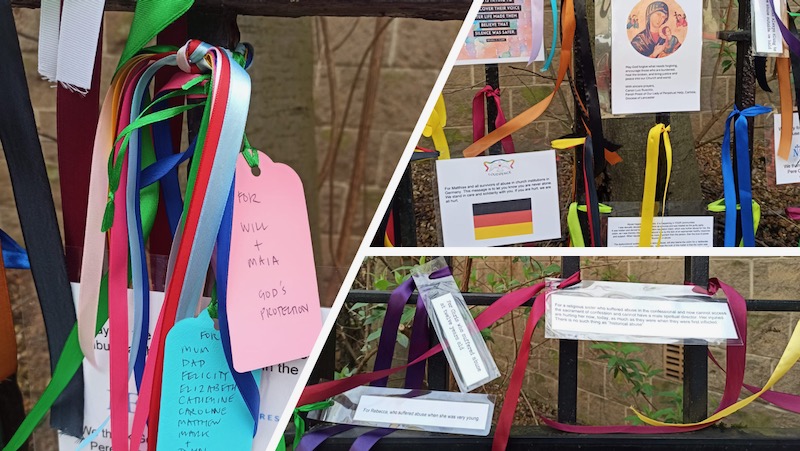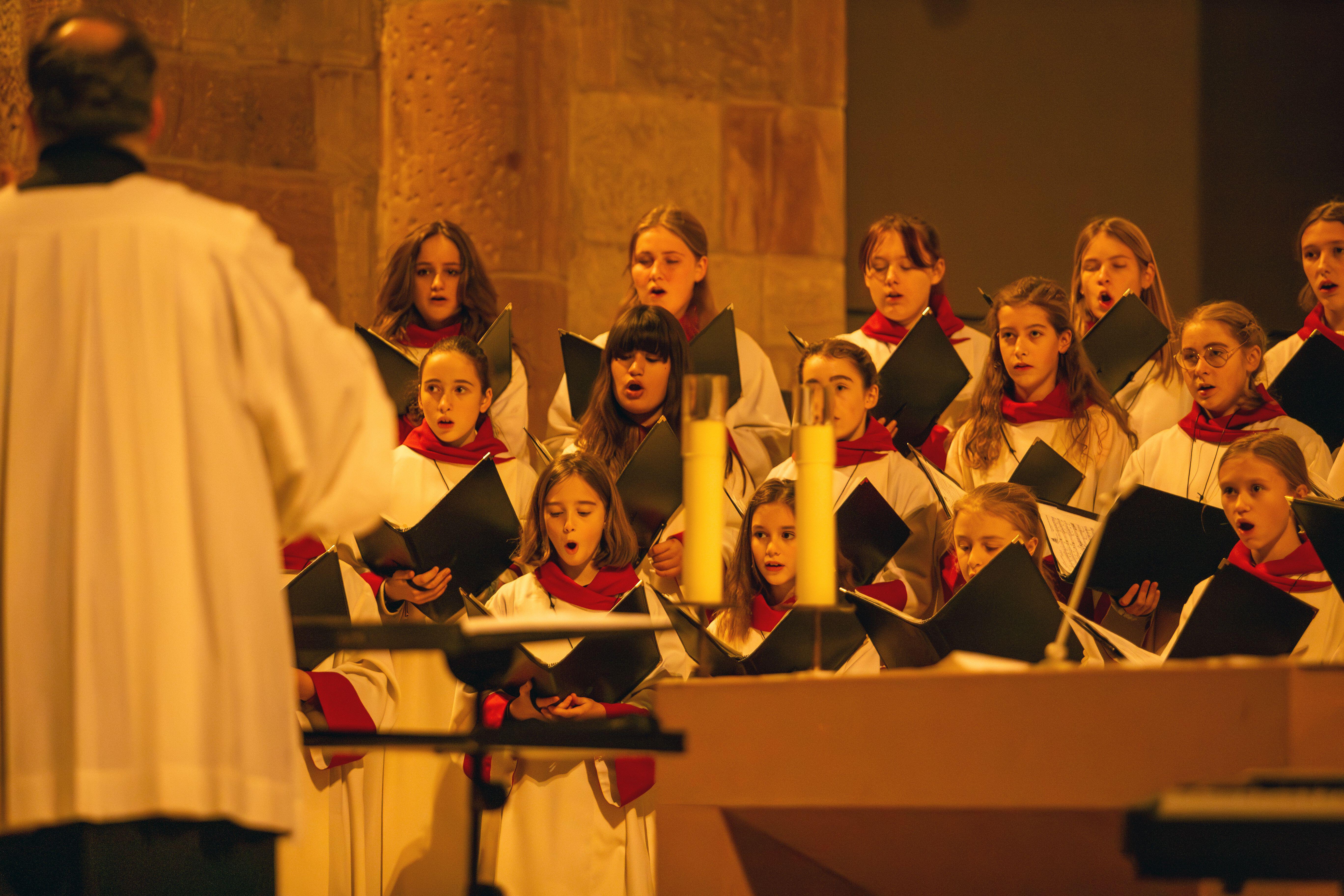Our parish has just started something which feels almost like an old-fashioned ‘mission’ exercise, but instead of being about personal salvation and the Four Last Things, this is all about our responsibility for our own parish. It’s taking place across three weekends. The object is to turn every parish member into some sort of volunteer within the parish; by the third weekend, we will be invited to sign up for some area of parish life where we can contribute our time, our talents or our treasure. The basis is very sound : we have inherited a busy working parish from our predecessors, and it’s our responsibility to pass it on in good repair. Here we all are, with our various funds, interests and expertises, in quite a big parish, but only a few people end up being the people involved in organising any activity, or keeping it running. The call to action follows (and may well be a part of) a general reorganisation of several local parishes and redistribution of authority at a diocesan level, which we have also heard about as having happened just recently, but I can’t be sure because no one seems to have much idea of what it will involve yet.
The Parish Council has been preparing since October, Father said on Sunday, but for the rest of us, the enterprise started with a brief email, just before Easter, to those already doing something official. I received it as choir leader, and it asked for a brief statement about our particular group. The email went to the various choirs, the flower guild, children’s groups, cleaning rota, adorers etc., arranged as a simple set of questions and answers to be filled in and elaborated as we wished: what is the purpose of the group, what is the time commitment for members, when and where does it meet, what extra activities is it involved in, and so on. The idea is to have a contact sheet for each group with accurate information, because although you can track down some of the information on various noticeboards, and you could always try asking in the Parish Office, a lot of the information circulating is out of date.
It’s tricky doing this sort of thing because some people know already and others aren’t interested anyway; the aim is to grab the attention of a middle group of the not-yet-involved. But this is the sort of thing all our parishes will inevitably be doing more of in the years to come, as our priests become fewer and older. The parishioners are definitely fewer too, but they are still attached to their local church, and don’t appreciate being herded into possibly more practical but more widely-flung groups, possibly focussed around a different church. Various dioceses are trying slightly different models, but in the end what it boils down to is that the lay people in every parish will have to take a more active role just to keep any activities at all running, as a priest rushes between different Mass centres. At the moment that is a depressing prospect, especially because of the lack of consultation.
We haven’t been asked about the thinking behind any of this or consulted in any way until this moment, when the pressure is on to volunteer for a set model of activities. Parish life will definitely be changing, but there doesn’t seem to be much attempt to think strategically about how we might improve it to make it work better; it’s more a question of desperate firefighting to preserve what we can, even though most people think that the old model was seriously flawed. I had been hoping that one of the consequences of the Synod and parish input into it would have altered the way the clergy thought about working (maybe even co-operating?) with the laity. Some of us spent a fair bit of time on the synod at parish level, and I wrote about it here, but any feedback has dried up. It makes you wonder whether our earlier input has actually registered.
It’s worth remembering that the model for being Church has been in constant flux since the Resurrection. After Easter, especially in our current liturgical year, Year B, the readings focus on the little groups of Christians, the earliest versions of the Church, and how they make things up as they go along (in Acts). Some of it sounds idyllic, working systems of loving cooperation (Acts 4:32ff), but in other cases opportunities are missed and choices made which lead to fossilised problems which we still can’t deal with, like the decision to make only male helpers official (Acts 6:3ff). It’s clear from the Biblical accounts that there are lots of women around in the early Church doing important work and often supplying the funds as well, but you have to read the text very carefully not to miss their input, and it seems to me that this has caused problems ever since.
For a long time before the present day, the laity was discouraged from taking an active role in the parish management. Clericalism set in very early, being one of the hardest attitudes to prevent in any religion. All it is, is the Christian version of the Pharisaism that Jesus spent so much time pointing out. Priests were the insiders and the rest of us were firmly outside, with even the taking of communion more often than once a year being weaponised. Mass was not a communal celebration but a performance to be watched from afar.
Even lay readers are quite a modern invention, and lay female readers really very recent. I’m not that old but my childhood parish was quite old-fashioned, and I well remember Masses where the congregation did nothing other than recite the rosary throughout Mass, while Father mumbled or whispered the words of the Proper and the Consecration quite deliberately not to be heard. One older man among the altar boys was the single person whose job was to answer with the Amens, and everybody thought it was quite normal. It’s strange to look back. We have come a long way, but there is still a lot that needs to change.
Obviously parish life is better if we all join in. It’s exactly the same as parish music. I don’t like Masses where a choir provides the music as an add-on, and the point of our own choir on Sundays is to lead the congregation and strengthen its confidence, so that we can all sing together. We make it as clear as we can that everyone is expected to join in, even taking a few minutes before Mass so that we can run through the psalm response and the Gospel Acclamation, to ensure that the Response is sung by everyone and the Gospel acclaimed by all the congregation together. There are always going to be some people who won’t choose to sing, and that’s fine. I’ve been to Masses after a bereavement where I could not even join in the speaking without choking up, so I always give people the benefit of the doubt. Music is powerful, singing engages your whole being, body and soul, and sometimes it is just too much. But that’s why the congregation is there, to support and to be supported. I remember one priest saying to his people, “If God gave you a good voice, sing to praise him; if he didn’t, sing to get your own back,” and I am always happy to hear more tonally-challenged people singing along.
Choosing the music is an important responsibility that I don’t take lightly. I need to engage the people; there is no point in my doing it all on my own. My job is to enhance the liturgy, following the themes of the readings, offering extra emphasis, picking up references, developing relevance and resonance. I tend to like older hymns with a bit of theology about them, but we also sing good modern ones (I’m not so keen on mindless repetition or tunes that don’t go anywhere), some Latin for those who love it and harmony when the right people are present. You always try to go just a little bit further.
Engaging people is what counts, and this is what our new parish initiative is aiming for. There will be a talk at every Mass across the three weekends by the parish priest, and people available outside afterwards to answer questions and encourage enquirers.
I am concerned that we have input at a parish level, and we had our contributions despatched some time back for consideration at the Synod meetings in Rome, but there seems to be a gap in the middle. The Synod process, originally so welcomed, does not seem to have changed the way we approach anything. There has been no discussion whatsoever about the upcoming Lectionary changes, or, closer to home, about the reorganisation of parishes that we have recently heard about. The very real questions raised in the synod discussions are just being politely ignored, as far as we can see, and those who preferred the status quo ante are beginning to relax, confident that nothing is actually going to change. The Synod process is continuing, but well out of our reach, and without affecting the way things continue to be done at grassroots level.
The point must surely come when the female majority in most congregations begins to wonder why they are so consistently excluded from any discussion. Why they never hear about what’s being considered in the deaneries, but they are sent the rosters for the jobs that no one else will do. They do these jobs with joy. They want to help. They are indeed part of the parish stewardship. But they could do more as partners and helpers, rather than children or servants. And it’s not only the women. There are plenty of husbands, brothers and fathers in our congregation who are embarrassed by the Church’s attitude towards the very people it relies on to do a lot of the work. We can offer our talents to God; but what do we do if the hierarchy prefers to bury and forget about them (Matt. 25 14ff)?
Kate Keefe composes musical settings for the Mass and writes about the psalms. You can follow her on Facebook, Twitter and LinkedIn.



 Loading ...
Loading ...
What do you think?
You can post as a subscriber user ...
User comments (0)